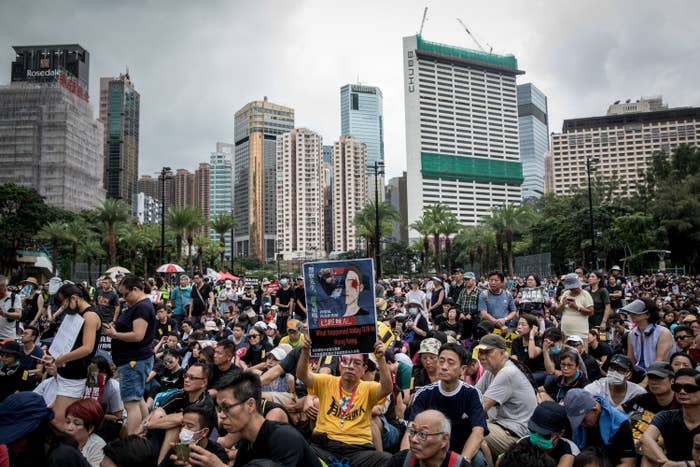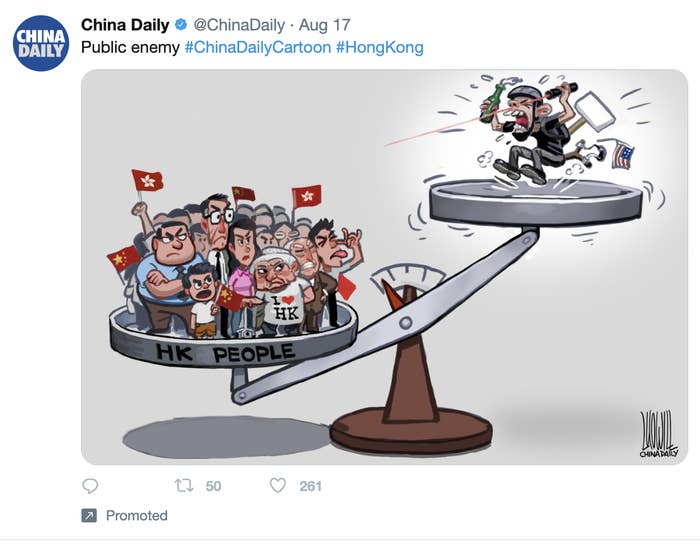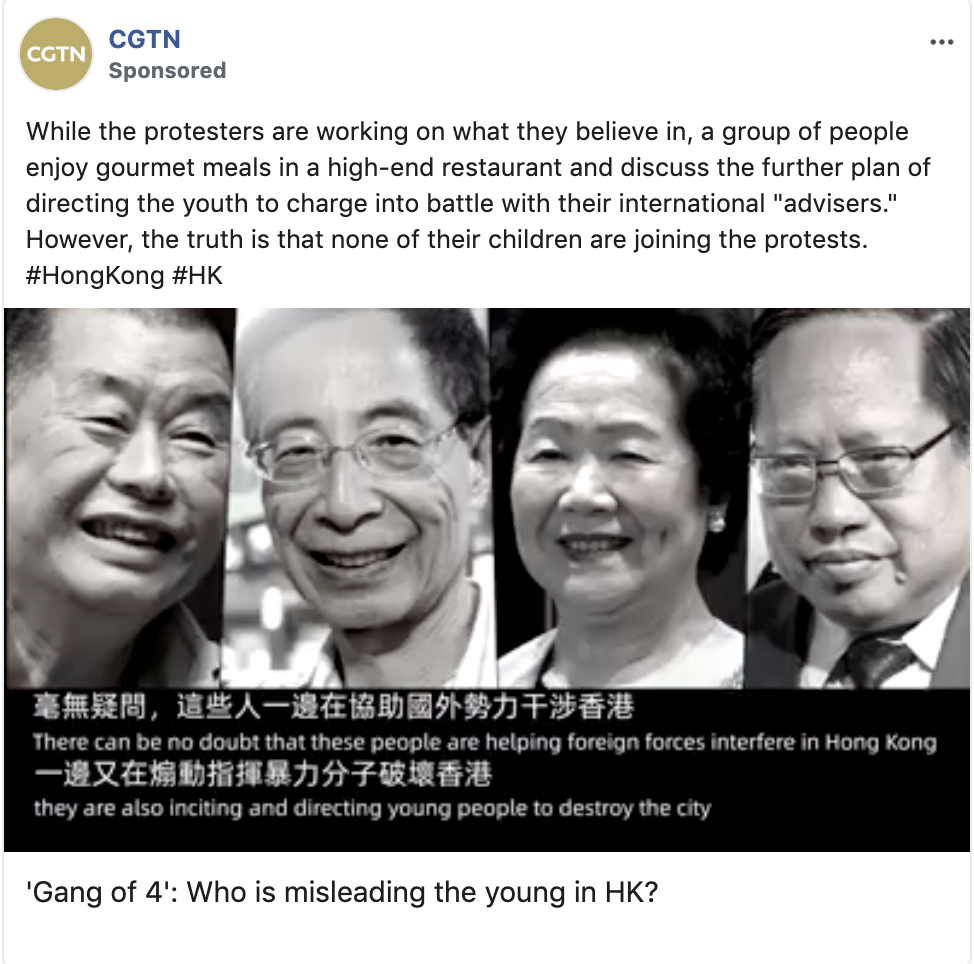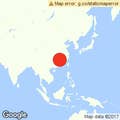
HONG KONG — Chinese state-run media outlets have been buying advertisements on Twitter and Facebook to push the Chinese Communist Party’s narrative of the demonstrations in Hong Kong, painting protesters as the “public enemy” and claiming a “silent majority” does not support the pro-democracy movement.
China has been using increasingly hostile rhetoric about the protests in its state media for weeks. But the ads mark a new step in trying to reach wider audiences — BuzzFeed News found nearly 50 different promoted tweets from the Twitter accounts of Xinhua News Agency, China’s official state-run press organization; the Chinese Communist Party–owned China Daily; and China Plus News, the English-language site of the state-owned China Radio International. Similar ads were also running on Facebook from Xinhua and CGTN, a state-owned 24-hour news channel that broadcasts in English.
The Chinese government has struggled to contain the narrative of the months-long protests, which have seen pro-democracy activists face increasingly aggressive police tactics in the streets. Though Twitter and Facebook are banned in China, the Chinese state media runs several English-language accounts to present its views to the outside world.
“It’s very clear that the Chinese state media is essentially buying ads on Twitter and Facebook for the purpose of reaching an international audience as part of China’s effort to ‘tell its story better,’” said Adam Ni, a China researcher at Macquarie University in Sydney. The Communist Party sees this “as critical in the battle of hearts and minds,” he added.
The protests in Hong Kong have been widely covered by international media with videos of police confrontations and million-strong marches dominating an information stream that China usually has the ability to control within its own borders. The Facebook and Twitter ads, however, represent state media’s attempt to wrest back control of the story from foreign media with promoted tweets and Facebook posts that are meant to depict the protesters as a violent minority corrupted by outside influences.
China has steadily ramped up its rhetoric against protesters in the last few weeks. Initially, China tried to block the flow of information to mainland Chinese residents, but has increasingly accused the protests of collaborating with foreign forces, including the United States government, and attempted to cast the protesters as villains. Last week it said that the protests showed “signs of terrorism.”
On Saturday, China Daily promoted a tweet with a cartoon captioned “Public enemy,” featuring a single protester with a Molotov cocktail and a US flag being outweighed on a scale by a group of disapproving onlookers.

“Twitter is the sort of natural battleground,” said Kerry Brown, the director of the Lau China Institute at King's College London, who has written extensively on China.
“Ironically, China can’t answer its critics on WeChat, because the critics are censored," he said, referring to a messaging platform popular in China. “The protesters are very active on Twitter, so it’s a natural place to do it. It has to go where the oxygen is.”
Twitter’s ad library, which launched in June 2018, only shows advertisements that have run in the last seven days. BuzzFeed News found 49 tweets relating to Hong Kong that were promoted between Aug. 12 and 19. There may have been more; the library also displays warning signs for content that had been removed for violating its ad policies. Those warnings do not show the content that was removed.
Another ad from Xinhua, which has 12.6 million followers on Twitter, featured a video of a series of unknown individuals speaking negatively of the protesters as “lawbreakers” and commending the police as clips of demonstrations cut in and out.
“'China is our home, our motherland,'” reads the Sunday tweet, which has been retweeted 124 times and liked 517 times. “Hong Kong citizens call for stopping violence, ending chaos and restoring order in the city.”
"China is our home, our motherland." Hong Kong citizens call for stopping violence, ending chaos and restoring order in the city
That tweet was first noticed by @Pinboard, a Twitter account run by Maciej Cegłowski, a US-based web developer who has been observing the protests from Hong Kong. “I just came home from a completely peaceful march where possibly a million Hong Kong residents came out, with no police in sight, to call for basic democratic rights,” he wrote on Saturday. “What greets me is straight up lies from Xinhua about ‘bands of thugs’, courtesy of Twitter advertising.”
@thegrugq I just came home from a completely peaceful march where possibly a million Hong Kong residents came out, with no police in sight, to call for basic democratic rights. What greets me is straight up lies from Xinhua about "bands of thugs", courtesy of Twitter advertising.
Ceglowski did not return a request for comment. In a later tweet, he admonished Twitter for taking ad money from an “orchestrated state-backed campaign to discredit and dehumanize the authentic voice of Hong Kong.”
Following an inquiry from BuzzFeed News and pressure from accounts like @Pinboard, a Twitter spokesperson confirmed that at least one ad from Xinhua had been taken down due to violating the company’s content policies, but did not say which ad. Twitter did not respond to questions regarding how the Hong Kong protest ads were targeted or how much money was spent in total on the promoted tweets by the Chinese outlets.
Shortly after this story was published, Twitter announced that in the future it "will not accept advertising from state-controlled news media entities." The blog post with the declaration did not name specific outlets which would be affected but noted that any accounts that fall under the new policy "will be free to continue to use Twitter to engage in public conversation, just not our advertising products."
Facebook did not follow Twitter's suit, and in a statement late on Monday afternoon said that it would "continue to look at our policies as they relate to state-owned media" — but would still allow those outlets to run ads on the platform. The company said it would also re-examine specific ads about protests in Hong Kong that were brought to its attention on Monday.
Chinese state outlets have used ads on Facebook and Twitter before, particularly to promote its development in Xinjiang province, where the country has been accused of human rights violations against the Muslim Uighur population, said Ni. But what’s new with Hong Kong is “the state media rhetoric and narrative are so vastly different from what we see on the ground.”
“The international community can easily spot the incongruences and in fact the blatant lies,” he said.
The protests started in June over a proposal by the government that would have allowed extraditions to China. Since then, the protests have evolved into a broader resistance against China’s encroachment on the semiautonomous territory, demanding universal suffrage and an investigation into police violence.
Protesters are also working to spread their message to the international community, and raised funds to run 18 ads in newspapers across 13 different countries this week. One ad, running in the New York Times on Monday, appealed to readers to “catch Hong Kong as we fall,” urging readers to call their senators and representatives. In June, protesters used a crowdfunding campaign to run ads around the G20 conference as well.
On Sunday, as many as 1.7 million people marched in the latest mass protest despite heavy rain, according to the Civil Human Rights Front, which organized the march. Police had approved a rally in Victoria Park, but did not approve a march, citing safety reasons. Protesters defied this, but the day remained peaceful, and there were no standoffs with police that ended in tear gas being fired, which have come to characterize the protests. Messages on Telegram and a local forum encouraged people to go home as the night wound down.
At a protest in the airport last week, demonstrators held hostage two men whom they believed to be working undercover — including one who was confirmed to be a journalist from the state media outlet Global Times — and many viewed this weekend’s largely peaceful demonstration as a check of how broad of support there was for the movement.
“The airport was not great publicity for protesters,” said Brown, who said China may have seen that as an “propaganda opportunity” to better tell its own side.
That may be the case for Xinhua, which started running Facebook ads about the demonstrations on Sunday, and currently have five in circulation in which it claims the public is calling for the government to “restore order.” The Xinhua ads, which were first reported by Gizmodo, are running in Hong Kong and neighboring countries, including Indonesia, Thailand, and the Philippines, but not in predominantly English-speaking regions such as the US, the United Kingdom, or Australia, based on a BuzzFeed News analysis.
Facebook’s ad library, which is more comprehensive than Twitter’s, shows that CGTN began running promoted Facebook posts on Aug. 13, when it ran a video of a Hong Kong police officer who had been allegedly hurt by a “petrol bomb.” CGTN has more than a dozen ads, some of which are being shown in the US, to push the idea that foreign influence is a major reason behind the demonstrations.

In one, a CGTN video heavily implies a “Gang of 4” Hong Kong politicians are taking marching orders from the US to direct “the youth to charge into battle with their international ‘advisers.’”
“These can be no doubt that these people are helping foreign forces interfere in Hong Kong,” reads a subtitle on the video.
Facebook did not immediately respond to a request for comment about these ads or how much money it's made from the promoted content.
Some of the promoted tweets also play up the conspiracy that the Hong Kong protests are not organic. A Xinhua tweet from Aug. 10 was promoted to ask about a supposed US official who met with “‘Hong Kong Independence’ activists.” Another post from China Daily, which has more than 4 million Twitter followers, read, “How American democracy and freedom damage the world peace?” It features a video of former secretary of state Hillary Clinton making foreign policy statements as war footage from Syria and Libya plays below her.
“Now America actually intervene the Hong Kong affairs,” a subtitle reads near the end of the video.
The China Daily ran a bizarre advert of a Chinese rap video condemning protesters that spread over the weekend. Featuring a cameo from President Trump, the clip was promoted by China Daily in a tweet on Saturday, while other Chinese state-run accounts boosted the video and claimed it was “#TrendingInChina.”
The China Daily promoted post with the video did well on Twitter, garnering more than 200 retweets and nearly 1,300 likes.
Hey #HongKong protesters! Chinese mainland rappers have something to say
UPDATE
The story has been updated with comment from Facebook, which said it would still allow state-owned media outlets to run ads.


